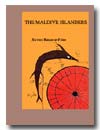|
28 December
2006
This article originally appeared in The
Graphic of 16 October 1886
|
The preparations for my visit to these islands
were commenced in the spring of 1884 will as it had been my intentions
to proceed here in October of that year; but the combination of
accidents prevented my departure from Colombo at the appointed time,
and I had therefore 12 months for another opportunity. This delay
was unavoidable owing to the fact that dividend total dividend could
have done highly seen which prevails around the islands during the
southwest monsoon makes a landing gear a rather dangerous matter,
especially if one is cumbered wooden boxes of instruments and stories.
It was necessary for me to arrive in after the setting the end of
the North East monsoon about the middle of October, so as to have
as long a spell of fine weather as possible.

Máldive trading boats
lying in the harbour of Málé |
Seeing that the Máldives were a dependency
of the Government of Ceylon before that colony passed into the hands
of the English in 1796, it cannot but be a matter of some surprise
that the information possessed concerning them should be of such
meagre description. The Máldivians have long been known as
a peaceful and hospitable race, though shy and suspicious with strangers
until they have satisfied themselves of the latter’s friendly
intentions: they are not too conservative to oppose the adoption
of new ideas if these are properly introduced: nor are they deficient
in commercial aptitude. One cause of the islands having been so
much neglected is undoubtedly to be found in the bad reputation
acquired by the climate: and another is probably a certain reluctance
on the part of the Ceylon Government to meddle, or appear to meddle,
with the affairs of the Máldivians.
I am not by any means the first European who has paid a visit to
the Máldives; but I can justly claim to be the first who
has undertaken a systematic exploration of the groups, and who for
that purpose has taken up abode his abode among and associated with
the people. By the courtesy of the English Government I had been
given a passage in the steamer Ceylon, the vessel in which
Captain Wilding makes his periodical visits to the lighthouses of
Minicoy and the Basses. It was arranged that, as she was to proceed
to Bombay to have some repairs effected, I should be left on the
way at Malé, and that she should return and fetch me away
in two months’ time.
At length, on the morning of the 25th October, 1885, the Ceylon
steamed out of Colombo harbour and shaped her course for Malé,
the capital of the Máldive group, situated on the island
of the same name, at the southern end of North Malé Atol,
exactly in the centre of the group. We sighted land about 9 AM on
the morning of the 29th, being then between four and five miles
distant; but there were no landmarks to indicate which of the twelve
thousand islands which constitute the Máldive group was then
before us. Soon a number of fishing boats could be seen approaching
and the engines were stopped to enable us to get a pilot on board,
from whom we learned that we had shaped our course correctly, and
had arrived directly opposite to the island of Malé. The
panorama, which was now spread out before us, was beautiful in the
extreme. The low shore, marked by the thin white line of the beach,
was covered to the height of about seven feet with a thick growth
of jungle, above which waved the graceful heads of thousands of
cocoa-nut trees, to which the slight breeze then blowing imparted
a scarcely perceptible motion. As I leant over the bulwarks, admiring
the scene, I suddenly became aware of a painfully pestilential odour,
which at once dissipated the romantic thoughts, which the beauty
of the scene had conjured up. This was the much-dreaded fever-laden
breath of the lagoons, the cause of the deadly Máldive fever.
This stench is due to a peculiarity in the Atols, or clusters of
islands and reefs which constitute the Máldive group. Most
of the islands are small, varying from a hundred yards to a mile
in length and breadth, and are seldom more than six feet above the
level of the sea. In many cases the islands form part of a ring
of coral rock without any opening, the consequence being that when
the sea is calm, the enclosed water becomes rapidly putrid under
the action of sun’s rays, and emits the odours to which I
have referred. Indeed, many of the islands are quite uninhabitable,
owing to the coral ring having grown to a height sufficient to exclude
any but the highest waves; others, again, are only unhealthy during
the hot season, the outside sea being able to beat over the barrier
during the time that the south-west monsoon is blowing, and thus
to constantly renew the water within. I discovered afterwards that
the lagoons which emitted the odours did not affect the town, or
island of Malé.
 Rosset mistook this as the
flag of the Ottoman Empire
Rosset mistook this as the
flag of the Ottoman Empire
|
When we had arrived within five hundred yards
of the shore the Turkish flag, which floated from the flagstaff
in the northern corner of the old Portuguese fort, was lowered in
salute, the Ceylon returning the compliment by dipping
her ensign three times. The anchor was dropped shortly afterwards,
at about two hundred and fifty yards from the beach, as foreign
vessels are not allowed to enter the harbour of Malé without
having first obtained the Sultan’s permission.
The sight of the steamer had by this time attracted crowds to the
beach, and it seemed as if the entire population of male had turned
out. About half-an-hour after the anchor had been dropped a large
canoe could be seen issuing from the harbour; it was propelled by
forty rowers, and was soon alongside. It conveyed the messengers
from the Sultan, who were sent to inquire what business had brought
us there, and I at once handed them the letters of introduction
with which I had been furnished in Ceylon before my departure, at
the same time expressing my wish to be conducted as soon as possible
to the Prime Minister, E. A. Abraham Deedee, to whom I had been
specially recommended. One of the messengers, named Ibrahim Deedee
(who, I was glad to discover, was able to speak a little English),
told me that if I returned with them to the shore my request could
be immediately complied with, and I accordingly entered the canoe
with them.
The passage through the surf in these boats is at times a matter
of danger. They are built of a length quite out of proportion to
their breadth, which makes them very unseaworthy, and to add to
the discomforts of the passenger he is obliged to stand up in the
stern, as no seats are provided for his accommodation, so that unless
he keeps a very sharp look-out he runs considerable risk of being
shot overboard when the stern is lifted by a wave, in which case
no power on earth could save him unless he happened to be a very
expert swimmer. The boatmen themselves, being as much at home in
the water as on land, are naturally indifferent to the danger; in
fact, they are well used to being ducked.
As I stepped ashore the Vizier came forward, and , taking me by
the hand, led me away at once through the principal streets of the
town. Close behind us walked my two Cingalese servants, dressed
in a gala costume of red satin, whilst a crowd of inquisitive Máldivians
brought up the rear, forming a procession of quite respectable length.
We soon arrived before the entrance of a large compound surrounded
by a high wall, in the centre of which stood a small building, which
I afterwards discovered to be the Kacheri (Town Hall),
which I was invited to enter. The entrance, destitute of any door,
was very low, and it was necessary to stoop nearly double in order
to penetrate to the interior, which was so dark as to make it impossible
to distinguish anything for several minutes after leaving the fierce
glare without. A seat was offered me, and accepted, and four individuals,
whose dress bespoke them as persons of rank, took their places,
two on either hand. Not a word had yet been spoken since I landed,
and the silence continued unbroken for several minutes after we
were seated. I tried to make out what my companions were like, but
the semi-obscurity of the apartment rendered their features very
indistinct; so far as I could make out they appeared to have regular
features, and that tranquil expression usually found in Orientals.
No two of them seemed to be of the same colour; one was quite fair,
the second darker, while the third and fourth had complexions which
approached a mahogany tint.
The silence at length began to get irksome, and I therefore inquired
of the messenger whether I should soon be able to speak with the
Prime Minister. He replied that his Excellency was then seated on
my right. I at once addressed myself to him, and, after naming different
gentlemen in Ceylon who had sent complimentary messages to him,
made my request for an audience of the Sultan, adding a few words
touching the object of my visit. He inquired whether I had any letters
for his Majesty the "Sultan and King", to which I replied
in the negative. I had been advised in Ceylon not to take letters
for the Sultan, who can neither read nor write, and with whom it
is advisable to have as little direct intercourse as possible, he
being very averse to Europeans. In requesting the interview with
the Sultan, I further asked for permission to make a lengthened
stay in the islands, and to be allowed to build houses, collect
specimens, and travel from one island to the other through the group.
The Minister departed to carry my requests to the Sultan, and returned
in about half an hour. He informed me that the Sultan would be unable
to reply to my request for an audience for eight or ten days; that
he could not give me any answer touching my wish to travel about
the group; but that instructions had meantime been given for houses
to be placed at my disposal, and for any provisions I might require
to be supplied. This was exactly the answer I had expected, and
I was about to express my thanks and withdraw, when Abraham Deedee
informed me that if I desired it I could have the use of a house
and compound belonging to him, which, being on the shore of the
harbour, would be much more convenient than one in the centre of
the town.
I gladly accepted this kind offer, and after thanking him took my
leave, as I wanted to return on board and get my boxes (of which
I had forty-five) ashore before night. The natives gave every assistance,
and the work was accomplished in good time, and I was able to return
on board before sundown, leaving my two servants to arrange the
house which had been set apart for my use. The next morning I bade
"good-bye" to my friends captain Wilding and the officers
of the Ceylon, and went ashore in the native boat which had been
sent off for me. A stiff breeze had sprung up during the night,
and the high sea then running made the short passage to the beach
very trying, whilst the rain which was pouring down added to the
discomfort; so that I was very glad when the beach was at length
gained in safety, in time for a last look at the Ceylon, which was
steaming off in the direction of Minicoy.

House and compound of E.A. Abraham Deedee, Prime Minister |
Malé is situated at the South eastern
corner of North Malé atol, and is the seat of Government
of the group. It is about a mile in length by three quarters in
breadth, and, like most of the other islands, is in no place more
than from six to seven feet above the sea level. The harbour has
been formed from a part of the lagoon enclosed by a barrier reef
which nearly surrounds the island, and on which a kind of the sea
wall about four feet high has been built with rough blocks of coral.
The harbour thus formed affords very efficient protection to the
Máldivian trading boats and fishing boats: but the entrance
is too narrow for vessels of more than 200 tons to enter.
The town of Malé struck me as being more regularly laid out
and cleaner than is generally the case in Eastern countries. The
streets are straight, broad, and shaded with trees, and are kept
very clean. The houses are mostly built of plaited coconut leaves
plastered over with a stiff mud, and roofed with coconut leaves
thatch; they are usually divided into two apartments, communicating
by a doorway closed by a curtain. The front apartment is the general
and sleeping room in, and is furnished with benches round the wall
and a few stools beside the bed, which is always the most conspicuous
article of furniture in a Máldive house. This bed in is suspended
from the roof by chains or rope, the material of which depends upon
the caste to which the proprietor belongs; high castes using brass
chains, middle casts iron chains, and low casts coiled ropes. The
legs are also provided in order that the bed may be lowered down
in case of illness, when the swinging motion to which it is liable
would be a social danger or annoyance to the patient. The furniture
of the bed is a matter of great importance; high castes use a mattress
and pillows of red silk; middle castes are content with cotton stuff;
while low casts sleep on straw. The mattress on straw is covered
with a mat, the pattern and quality of which are regulated by the
caste of the owner. The Máldivians display great skill and
taste in the manufacture of these mats, which have acquired reputation
for harmonious design and permanency of colour. They are made only
in Suvadiva Atol from a grass called by the Máldivians hau;
only three colours are used - black, dark yellow, and white, which
are obtained from plants and are wonderfully lasting. Although the
Máldivians keep their houses scrupulously clean, they are
very unhealthy on account of being surrounded by a wall from six
to seven feet in height, which impede the free passage of fresh
air, this being the all the more hurtful as the openings in the
purpose of doors and windows are not very large. The bad effects
of this arrangement are apparent in cases of illness, when the patient
as often as not dies as much from want of fresh air as any other
cause. The inner compartment of the houses is reserved for the women,
who remain there when not engaged in household or other duties,
or when male visitors are in the house. They are not, however, secluded
with the same strictness as is observed in other Muslim countries;
on several occasions when I was visiting at some of the lower caste
houses the women of the household would join in the conversation,
though always remaining invisible in their apartment.
The remains of the fort erected by the Portuguese
during one of the temporary occupations of the islands probably
in the 16th century would seem to indicate that they looked upon
the Máldive Islands as a position of considerable importance.
In my view of Malé harbour it will be seen that the main
bastion is a structure of great strength; the walls of solid masonry
are upwards of 20 feet in height and in a good state of preservation,
though much overgrown with weeds and grass. Many of the old cannon
are lying about within the fort; but are, of course, quite useless,
being rusty, and choked with coral. A mast from a ship wrecked some
200 years back is raised in a corner of the bastion and serves as
a flag-staff. Scattered about the town are upwards of 200 old cannon,
all as unserviceable as those in the fort.
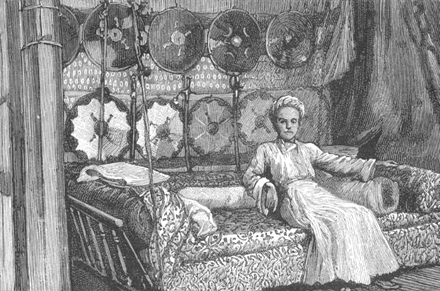 |
The Sultan’s palace is situated to the
north east of the main bastion, in the centre of a large walled
enclosure; before the gateway are placed about half a dozen old
cannon, the only ones capable of being used, with which salutes
are fired on great occasions. The palace itself is a large building
with an upper floor. Visitors are received in the verandah which
I was able to photograph. François Pyrard de Laval, a French
adventurer who visited these islands during his travels in the east
early in the 17th century, and was detained here for five years
from 1602 to 1607, gives a longer and minute account of the palace,
according to which it contained many fine halls tastefully decorated;
but during my stay I was unable to penetrate within, and cannot
therefore either confirm or amend his description. Within the palace
enclosure are several buildings used as stores, and an arena in
which the dances and sports take place, on one side of which is
a kind of raised covered platform for the accommodation of the ladies
of the court and some of the hired functionaries.
There are several mosques in Malé, two of them larger than
the others; but they offered no peculiarity either of structure
or ornament which would entitle them to special notice.
Malé being the centre of the government and trade of the
whole group, is naturally the most thickly populated, and as the
Máldivians not only invariably bury people where they die,
but are also very careful not to inter two in the same place, some
idea can be formed of the number of graves to be seen there. This
has been advanced as a reason for the unhealthiness of Malé,
and I think that the water drawn from the wells must inevitably
be contaminated.
The ordinary dress of the men is very simple, consisting of drawers,
a cloth bound round the loins, after the mode of the Cingalese,
and a handkerchief twisted round the head. On special days, such
as Fridays, when they attend the mosque, the high caste wear a shirt
and jacket, over which is a kind of long dressing down, coming down
and nearly to the feet. The turban is only worn by priests and the
Sultan.
The women's costume is exceedingly becoming. Round the waist, and
reaching down to the ankles, is worn a cloth (mostly of native manufacture),
coarse in texture, of a dark chocolate colour, with a border of
parallel black and white stripes. Over this they wear a kind of
loose shirt, or gown, of silk, with short sleeves, reaching nearly
to the knees, which is not made to fit to the neck and shoulders,
but is gathered in round them; the openings for the neck and arms
are ornamented with embroidery in gold, silver, and silk thread.
The hair, which is black, and generally long and thick, is tied
up behind, and a handkerchief of the same colour as the shirt is
bound round it. All ranks wear similar costume, the distinctions
of caste being marked by the difference in the quality of the silk
stuff of which the shirt is made, and of the embroidery.
The Máldivians are very quiet and reserved in their intercourse
with foreigners until their confidence has been gained, when they
show themselves hospitable to a degree. They have few wants and
in, and as they possess the means of easily satisfying them, are
inclined to be indolent; sober, honest, and cheerful, they compare
favourably with the inhabitants of many other Eastern countries.
They are very ingenious and expert in their manufactures, and display
great aptitude in the imitation of any European articles they may
come across, such as knife handles, scales, and other small articles
of daily use amongst us.
|
Editor's note
The King Ibrahim
Nooreddine Iskander, unlike the rest of his family and extended
family, was reputed to be extremely dark in complexion. Rosset
visited the Maldives in his first reign (1882-86). Until his
second reign (1888-92), the Islamic mullahs prevented the
Maldive kings from giving audiences to Europeans. They were
afraid of the kings being persuaded to accept Christianity,
as one did in the 16th century. Visiting Europeans who requested
audiences were always made to meet a commoner dressed as the
king. Rosset described him as fair in complexion indicating
that he had been shown someone else. Ibrahim Nooreddine Iskander
was the site editor's great-grandfather's younger brother.
The King was young, educated and very progressive in his ideas.
This was all the more reason for the colonialist mullahs to
keep their iron grip over him in order to preserve their crippling
control that still, even today, keeps the the Maldives in
the Dark Ages. His daughter the Princess Don Goma
wrote a book over many decades that was not so flattering
of the schemes of those who wielded real control in the Maldives.
The manuscript of the book, that was never allowed to be published,
was seized from Don Goma's grandchildren in the 1980s and
destroyed by the government. |
The Sultan is a young man of some 23 years of
age, strongly built, and with a well-proportioned figure. His complexion
is fair, and his regular features are well set off by a jet black
beard, worn short, as is the custom among Máldivian high
castes. He is of a very full habit of body, and the life he leads
is such as to preclude any possibility of his life being a long
one. His rule is absolute; and although he has ministers whose advice
he seeks on any occasion of importance, he seldom if ever profits
by their wisdom, and often takes the course directly opposite to
their views. He is very adverse to any intercourse with foreigners,
especially Europeans, whom he either refuses to see at all or keeps
waiting, perhaps, for weeks before granting an interview. At the
time of my visit this cautiousness had been very much increased
by the recent arrival of news from Zanzibar, giving details of the
doings of the Germans in that part, and he consequently fancied
that my visit had some ulterior and political design which he could
only frustrate by detaining me in Malé until the Ceylon
arrived to take me away again. Fortunately for me, his ministers
were not so prejudiced as their master, and gladly gave me all the
assistance they dared in face of the restrictions put upon them
by the Sultan. It is fortunate for this monarch that he has had
to deal with the English for the last century, also that his dominions
are a little out of the direct march of civilisation. But the time
cannot be far off when his only choice will lie between submission
to the Europeans or practical effacement.
Although not so strict as formerly, caste distinctions are rigidly
adhered to. The Sultan naturally occupies the highest rank, after
him come his near relations, who have the sole right of assuming
the title of Mannipul or Manifulloo; the next
in rank are the descendants of former Sultans, who have a right
to assume the name and rank of Didi, or Deedee. When the Sultan
appoints a minister, or wishes to show any particular favour, he
bestows a title, which has generally attached to it the ownership
of certain islands, which become either the life property of the
favoured person, or else are held by him during the Sultan’s
pleasure. The present ministers, with their titles and in order
of rank, are: Manifulloo, title Fatina Kilage-fanu,
Treasurer: he is a near relative of the Sultan, to whom he is next
in rank; but he has very little influence over the monarch, hardly
more than other high castes.
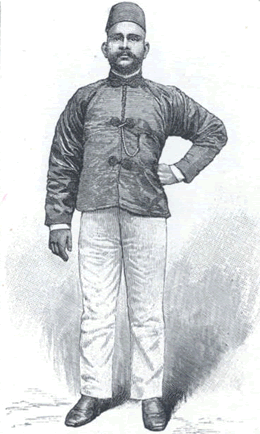
E.A. Abraham Deedee, Prime Minister of the Máldives |
E.A. Abraham Deedee, title Dorimaina Kilage-fanu,
Prime Minister: Abraham Deedee is undoubtedly the most enlightened
of all the Sultan’s subjects. To him is entrusted the management
of the trade of the Máldives, which already shows signs of
development in spite of the restrictions with which the Sultan hampers
it. He is a great friend of the English and spent some years in
Ceylon, acting as Turkish consul in Galle, an office now filled
by his son [the Prime Minister's great grandson is currently the
Turkish honorary consul in Malé and has been so for many
years. -ed.]. It is to him that I owe the success of my first visit.
I always found him ready to give me every assistance and information
in his power. Hassan Deedee, title Famu Dairi Kilage-fanu:
Hassan Deedee is a cousin of E.A. Abraham Deedee, and has the command
of the army; his principal duty being to superintend the fencing
and dancing games which are held periodically by order of the Sultan.
One interesting fact in connection with him is that he is the only
Máldivian man who is allowed to wear the old Máldive
costume, in which he was dressed when I took his photograph. This
costume nearly in resembles that worn by the women of the present
day. Next in rank to the ministers are the Viziers, who have charge
of the divisions, or boards, into which Malé is divided,
of which there are four. There are other titles bestowed by the
Sultan which are merely social distinctions, and many of which can
be obtained by payment of a few rupees.
The trade of the Máldives must all pass through in Malé and is mostly
carried on indolent on the principle of barter. The bazaar in Malé
is the only one which exists in the group, and it is here that all
the foreign trade is carried on. The shops are the personal property
of the Sultan, who lets them out to a number of Bombay merchants,
at rents varying from 15 rupees to 50 rupees per month. These Bombay
merchants mostly sell rice and cotton goods to the natives, taking
in exchange tortoise-shell, coconuts, cowries, and dried fish.
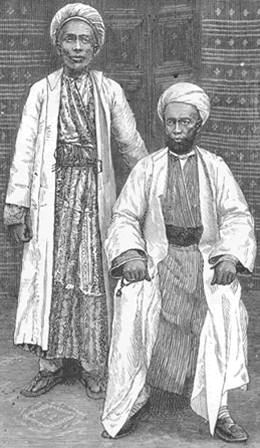 |
The Máldivians are Mohammedans, and it is generally
supposed that their conversion to the faith of the Prophet took
place some 700 years back. Although particular in observing the
fast and ceremonies of the religion, they are not so particular
as to the manner in which this is done. Their mosques are well built
in kept very clean; and there are several in Malé, but one is mostly
used for ordinary festivals and prayer, and is called the Friday
mosque. Superstitions exercise a great influence on the daily life
of the Máldivians, much more than religion. They are principally
afraid of the Devil, who is supposed to exercise great power, and
whom they make responsible for all mishaps which befall them; they
go out at night very unwillingly, for fear of meeting him. Should
illness visit a house, it is supposed that the inmates have offended
his Satanic majesty in some way, and prayers are addressed to him,
begging him to cease the supposed punishment; in extreme cases these
prayers are written on a piece of cotton stuff stretched on a small
wooden frame, which is exposed before the house.
The Máldivians do not marry very early; I believe the usual age
for men is between 18 and 20. Polygamy is allowed, according to
the Mohammedan law, the number of a wives being limited to 4. The
ceremony is extremely simple: the man having satisfied the parents
of his intended bride of his ability to support her, the pair attend
before the magistrate of their island, and signify their mutual
wish to be joined in matrimony. The magistrate thereupon declares
them to be man and wife, calling upon those assembled to be witnesses.
It will readily be understood that a bond so lightly tied can be
as easily severed; should a couple not agree, they attend again
before the magistrate, who, after satisfying himself that both parties
desire the separation, declares the marriage annulled.
The amusements are very few; indeed the islanders are of too indolent
and taciturn a disposition to enter with spirit into any pastime.
Fishing is their favourite exercise, and is indulged in to nearly
the same degree as hunting and shooting in England. They are fond
of kite-flying; but this pastime is only permitted at certain periods
of the year.
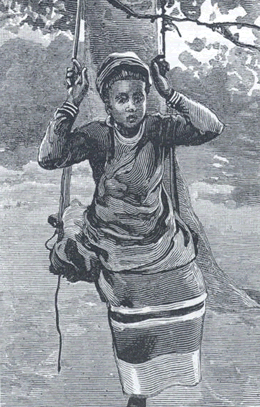
Girl swinging
This is the chief amusement of the Máldive women |
As in all Eastern countries, all household duties
are left to the women, who also have to prepare and cook their husbands’
food. They are not allowed to eat with their husbands; but must
first wait upon him until his meal has finished, when they retire
to their own apartment for their repast. As rule they are decidedly
handsome, and many of them have complexions nearly as fair as the
women of Southern Europe. They are better treated than in other
Mohammedan countries, having a great deal of liberty. They never
veil their faces, and the only restriction to which they are subjected
is that they are not allowed out at night, which is not any great
hardship for them, as the fear of meeting the devil is already a
sufficient inducement for them to remain at home.
Crime is very rare on the islands, and the punishment inflicted
would generally be considered mild in Europe. Death is never inflicted,
the severest penalty being banishment to an uninhabited island for
a period commensurate with the offence committed. The commonest
punishment is castigation, the blows being dealt on the back and
thighs with a sheet of leather inserted into a handle; but I was
informed that when the punishment is intended to be very severe
iron nails are inserted in the leather, which cruelly lacerate the
flesh; this must be of very rare occurrence, however.
I was unable to go further than the island of Malé on this
visit, as the Sultan (who suspected I had some ulterior political
design in visiting his country) refused to allow me to proceed further.
When he ultimately gave his consent it was too late, as the Ceylon
was then due to take me back to Colombo, and as I had arranged to
exhibit my collection at the Colonial and Indian exhibition, further
delay was impossible. I intend, however, to revisit the Máldives
before the close of the year, to complete the explorations begun
in Malé.
Following political upheaval in Malé,
Athireegey Ibrahim Didi Dorhimeyna Kilegefan (whom Rosset
calls E.A. Abraham Deedee) was dismissed as Prime Minister.
A serious arson campaign including burning down houses
and business premises of ordinary citizens ensued. The
ex-prime minister was implicated and charged.
Subsequently he was freed following intervention by the
British authorities in Colombo.
It was alleged that Ibrahim Didi engaged the services
of a witch (fanditha) doctor in order to regain
power. The following is an extract from Mysticism
in the Maldives by Ali Hussain, Iqbal Khaleel, Abdul
Hameed A. Hakeem, Ali Rasheed, and Shahina Ali. Maldives,
Malé 1991, published in the web site www.maldivesculture.com.
Even in the twenty-first century, fanditha black
magic is a growth industry in the Maldives. Supplicants
use it to determine the outcome of anything from football
matches to one-night stands and political fortune. Koranic
passages are used in fanditha, with Allah's
name usually written back to front in Arabic to read Hallaak
(the one who brings destruction). Spirits known as jinn
mentioned by Mohamed in the Islamic holy books serve a
central role in fanditha.
In 1886 an arson campaign organised in
Malé by Athireege Ibrahim Didi, included the use
of an Addu fanditha man to render the perpetrators invisible.
A fresh corpse was secretly exhumed and the liver removed
and boiled down into oil.
"To perform this type
of fanditha, the performer should remain unclean after
his bodily functions. Further, while performing the fanditha,
he should remain naked. In this state he begins to recite
incantations and burn incense. This to communicate with
the malevolent jinni from whom the fanditha man requests
assistance in his hideous task.
...the ex-Prime Minister [Athireege Ibrahim Didi] and his
conspirators... were to remain in an unclean state after
performance of their bodily functions. They were also instructed
not to wear any clothing, or to wear the minimum amount
of clothing, this also above the waist. It was essential
that they should be naked from the waist down.
...upon hearing [the fanditha man] Kudhu Abu's signal, they
were supposed to crawl ashore on all fours, imitating an
animal. In this manner they were to approach the mixture
of flour and human liver oil.
Kudhu Abu had prepared and apportioned this mixture in advance.
Each of the conspirators was to consume his share of this
gruesome mixture, and the one unable to consume it completely
would betray the rest. Before the night was over the sinful
and sacrilegious deed was done..."
Athireegey Ibrahim
Didi subsequently regained power more than once and finally
kept it after regaining it in 1903. He died in 1925 after
suffering a stroke, having endured the insubordination of
a young rebel by the name of Bodufenvalhugey
Seedi, this site editor's maternal grandfather. |
|




 rss feed
rss feed 
